
8 minute read
Loretta Hodge McCumbee
Trash
o Treasure
Advertisement
Loretta Hodge McCumbee is Columbus County’s own Indiana Jones
STORY Jefferson Weaver PHOTOS Justin Smith & Submitted by Loretta Hodge McCumbee
Loretta Hodge McCumbee loves pawing through trash. However, you won’t find her dumpster diving on a city street. Instead, McCumbee spends nearly every spare moment she has walking, crawling and sometimes wading through woods, forgotten homesteads and swamps, seeking old bottles, arrowheads, pottery, glassware and even prehistoric fossils.
“My husband tells me I need to be looking out where I’m walking,” she laughed. “My eyes are always on the ground.”
A love of history and art feed her passion for relic hunting, a hobby that was encouraged by her father, R.J. Hodge, when she was growing up near Loris. After she and her husband Gary were married and moved to Crusoe, she found a whole new relic-rich environment along the banks of the Waccamaw River. She also hunts old farms and homes across the area, always with the owners’ permission.
“I just love it,” McCumbee said. “I’ll be going along and see that sparkle, and l know I’ve found something good.”
Helping her father around the family farm and on other jobs, McCumbee learned to look inside old homes and buildings.
“I have a bird’s nest with an egg in it that was walled up in a porch,” she said. “It was old when we found it – it’s probably 70 years old.”
She isn’t afraid to delve into places that sometimes daunt other relic hunters.
“One time I crawled on my hands and knees, clipping briars, to get to an old trash pile,” she said. “I had to move a big old black snake off the
pile when I got there. I knew he was just sunning, but I told him I had to get in there.”
In addition to staples like large glass Clorox bottles, pottery shards, and patent medicine containers from the last two centuries, McCumbee has found antique toys, perfume bottles, glass marbles from the 1920s and 1930s, and even watches.
“You’d be surprised how many watches you find out there in the swamps,” she said. “Watches and watch bands. I found another Timex just the other day.”
Among her favorites are a fancy aluminum soap carrier from around 1907 and a Prince Matchabelli perfume bottle complete with stopper.
“That perfume bottle is one of my favorites,” she said. “I found it about four feet off the ground in a brush pile against a tree after Hurricane Matthew. The soap dish had to have come from somewhere away from here – it was completely out of place.”
Her devotion to her pastime causes some people, including her husband, to shake their heads.
“I was at one place where I could drive my truck almost to the trash heap,” McCumbee said. “Multiple generations of the family had used it, and it had never been cleaned up. I got there first thing in the morning, and had to walk out with my flashlight. I found 396 bottles at that site.”
McCumbee said she knew her husband wouldn’t be pleased at the massive haul.
“The owner said that they would say they hadn’t seen me,” she laughed.
Before modern day sanitation services, many rural families simply dumped their trash in a remote area on a farm, a wooded hollow or even in waterways. When outhouses still outnumbered indoor bathrooms, a full privy would often be turned into a new trash receptacle, and the outhouse structure itself moved to a new location.
Native Americans often used the same practice
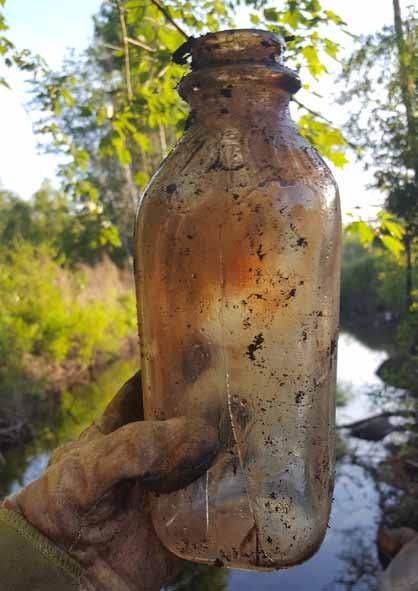
A recent find includes a Biltmore milk bottle with a heat crack.
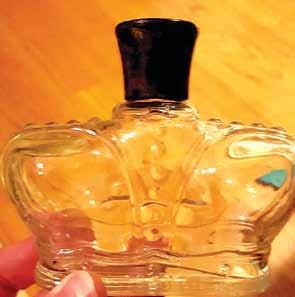
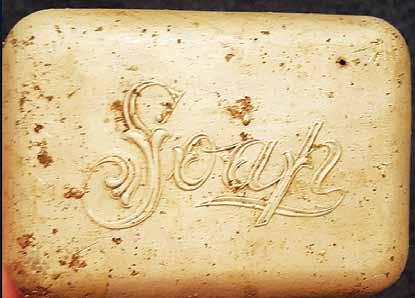
McCumbee finds and preserves artifacts from times gone by.
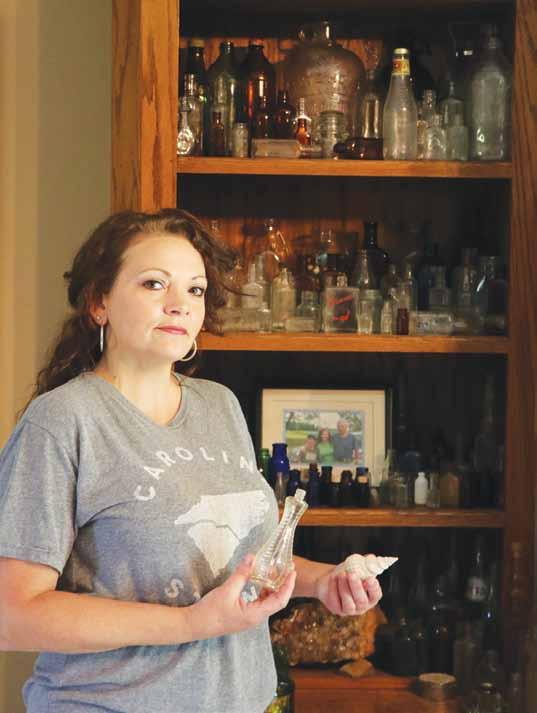
when settling in semi-permanent camps. Although discarded items made of materials such as leather and plant fibers eventually decompose, stone, clay and even some bone items can last for centuries when soil conditions are just right.
While trash piles make for big hauls of everyday items, McCumbee’s most productive hunting grounds are near bridges and roads along waterways.
“There’s so much that has been thrown out as people ride by, or floated down the river,” she said. “It’s fascinating to see what turns up, maybe even having floated all the way from Whiteville or somewhere else.”
McCumbee frequently scours the banks and sandbars of the Waccamaw, recovering projectile points of all sizes and eras, as well as pottery shards and other tools from the time before European settlers brought metal to America. Every storm or period of high water moves relics around, providing new treasures for the patient searcher.
She calls these types of relics “Natifacts,” her own term for native artifacts.
“All these things, you have to wonder about who held them before,” she said. “They were here long before any of us were. They were the first ones here, and we need to remember their history as well. Some of the work they put into these things is incredible.”
Some of her findings are even older. While shark teeth are common finds across Columbus

McCumbee’s collection of arrowheads. Pictured to the right is an unusually large cutting or flesh- ing tool she found in an area rich with native artifacts. The stone blade is shaped somewhat like a modern Buck knife. 18 | 954 | Spring & Summer 2020
Liquor bottle with tax stamp from South Carolina


Vintage soft drink bottles

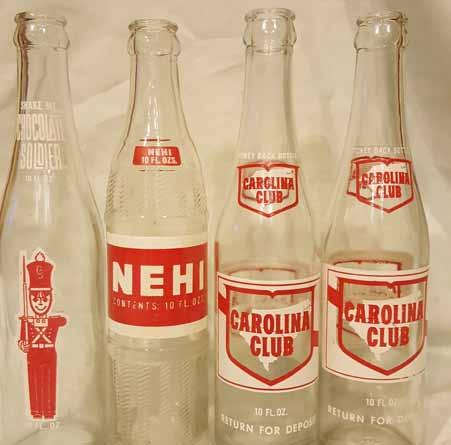
Left, Everyday household items like this bottle of Singletary’s insecticide and this graceful brown bottle that once held a “patent” medicine give a glimpse into family life in years gone by. Bottom right, 5 cent cologne bottle found in Charleston in the fallen doorway of slave quarters.
County (she has picked up more than 600), McCumbee has also located a section of fossilized vertebra larger than her hand. She said she plans to return to that particular area to search for more fossils.
“I’ve found fossilized fish, and other things that were preserved in the mud,” she said, “but that vertebra is special – I can’t wait to find out what it came from.”
She has learned to watch the river for the exact right level to wade to likely spots where relics of all kinds have washed downstream.
“It’s fascinating to see what you can find,” she said. “I’d never heard of Chugamug beer until I found two bottles in the mud by a cypress stump. And then there’s Electric Cola. It was bottled in Wilmington, by Coca-Cola.”
Some of her relics can be tied to an individual, like a 1927 hunting license from Columbus County, and a pocketknife that belonged to a State Trooper.
“The owner of the property where I found the knife said his cousin had lost that knife 20 years before,” she said.
McCumbee said she makes it a point to be a good steward of the ground she visits. Since the “good stuff ” is often a foot below ground, she often has to make her way through a layer of semi-modern garbage, including plastic.
“All the plastic I find comes home and goes in our recycle bin,” she said.
Even broken bottles, china and glass have a home. McCumbee previously worked for a jewelry store, and loves designing and making jewelry. She has a tumbler and glass cutting tools that she plans to use to turn some of her trash finds into treasure.
“I have several five-gallon buckets of fragments,” she said. “So much of the glass from the early 1900s is just so pretty. I want to see what I can do with it.”
Unlike some relic hunters, McCumbee is no snob when it comes to artifacts.
“I love all of it,” she said. “Everything you find has a story we can never know. I like going back and finding the history behind some pieces. “I guess I’m crazy, in a good way,” she said. “I like everything I find.”

A prehistoric shark tooth McCumbee found in Columbus County.
Experience...
An Endless Supply of Hot Water.
The Rinnai tankless water heater provides the ultimate luxury for your home - never ending hot water. Enjoy new features of today’s bathrooms such as spa baths and body spray systems all while running the dishwasher or washing machine.

COMPANY INC.

WE MAKE LOANS Home Improvement . Vacation . Holiday Cash
Education Expenses . Emergencies
Founded January 11, 1980 by John and Jean Giles. Proudly serving the Columbus, Bladen, and Robeson County Areas for over 30 years.
Please come and see Debby Giles Pate, Wes Giles, David Giles and Nancy Collins for all your financing needs.
608 S Madison St Whiteville, North Carolina (910) 642-5174
Mon - Tue: 8:30am - 5:30pm Wed: 8:30am - 1:00pm • Thu - Fri 8:30am - 5:30pm










